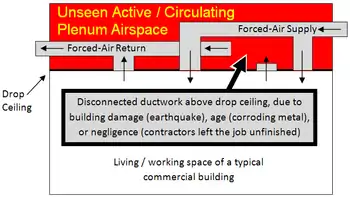Plenum space
A plenum space is a part of a building that can facilitate air circulation for heating and air conditioning systems, by providing pathways for either heated/conditioned or return airflows, usually at greater than atmospheric pressure. Space between the structural ceiling and the dropped ceiling or under a raised floor is typically considered plenum; however, some drop-ceiling designs create a tight seal that does not allow for airflow and therefore may not be considered a plenum air-handling space.[1][2]



Maintenance
Diligence is required to make sure that a non-plenum airspace stays that way. A non-plenum airspace can become a plenum airspace by accident if the ductwork is disconnected and not properly repaired and resealed. Ductwork disconnection can occur due to building damage such as earthquakes, aging, or adverse environment causing the metal to corrode and fall apart, or simply negligence on the part of building contractors that leave work unfinished. In all such cases, discovery, and repair of such problems to eliminate unintended plenums is difficult due to the hidden nature, limited space, and difficult access of most installed drop ceilings.
For highest fire safety, it is best to assume all drop-ceiling and raised-floor airspaces are plenums, whether or not they are officially designated as such, and to always use plenum cable in these spaces.[1]
References
- Thomas, Timothy. "What is plenum? - Definition from WhatIs.com, TechTarget, September 21, 2005. Retrieved July 25, 2017.
- National Fire Protection Association (2017). "Article 100 Definitions". NFPA 70 National Electrical Code. 1 Batterymarch Park, Quincy, Massachusetts 02169: NFPA. Retrieved October 9, 2023.
Plenum: a compartment or chamber to which one or more air ducts are connected and that forms part of the air distribution system.
{{cite book}}: CS1 maint: location (link)